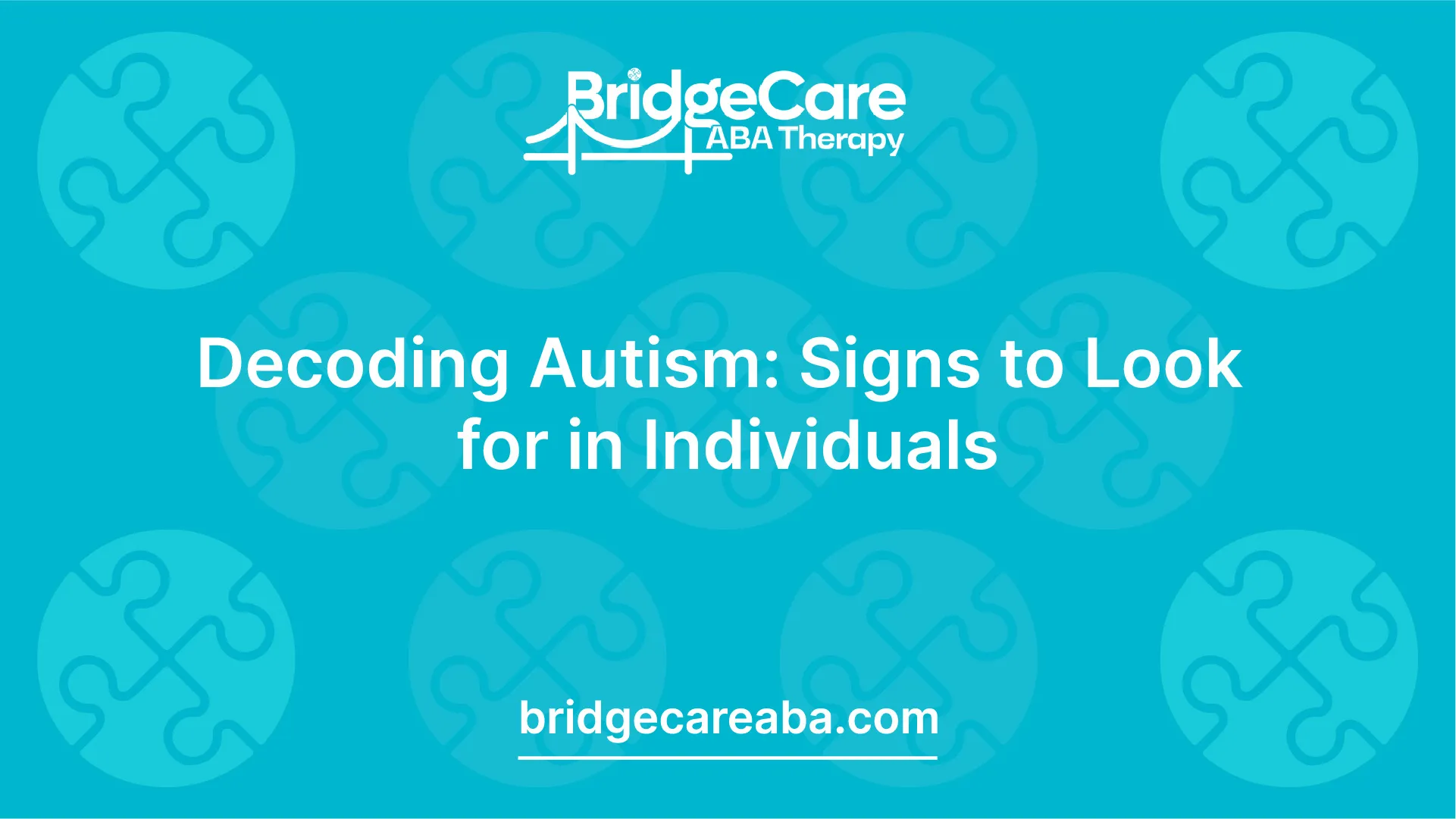Why routines matter help children with autism—according to an Autism Therapist
Why routines matter help children with autism—according to an Autism Therapist
Blog Article
Secret Symptoms And Signs to Recognize in People With Behavioral Autism
When you experience someone with behavior autism, recognizing essential symptoms and signs is important. You could discover difficulties in social interactions and interaction, in addition to a strong need for routines. Furthermore, sensory sensitivities can bring about overwhelming experiences. Comprehending these qualities can improve your assistance and interventions, yet there's more to discover about exactly how these actions show up in daily situations. Allow's discover what these indicators truly resemble.
Challenges in Social Interactions
When you communicate with a person on the autism spectrum, you may discover they struggle with social signs and interaction. These difficulties can make social communications feel overwhelming for them.
When they do engage, they may talk about their rate of interests in fantastic information without observing if you're interested. Recognizing these difficulties can aid you approach interactions with compassion and patience, promoting a much more comfortable atmosphere for both of you.
Difficulty With Verbal and Non-Verbal Communication

Non-verbal interaction can be much more difficult. You could see a lack of eye contact or restricted use motions, which can make interactions really feel uncomfortable. Faces might not always straighten with the conversation, resulting in complication regarding their sensations. Acknowledging these indicators is necessary, as it helps you much better assistance and engage with people on the autism spectrum. By understanding their interaction difficulties, you can cultivate extra meaningful links and provide a more encouraging environment.
Recurring Behaviors and Routines
Communication difficulties often go along with various other indicators of autism, such as repeated actions and a solid preference for routines. You might notice that individuals with autism commonly involve in details, repeated activities, like hand-flapping, shaking, or duplicating expressions. These behaviors can give convenience and a sense of control in a typically overwhelming world.
When they follow an organized schedule,Routines are equally important; many people prosper. You might discover that modifications to these routines can lead to considerable distress. If they have a daily ritual of consuming morning meal at a details time or adhering to a certain course to institution, any type of disturbance can cause anxiousness.
Identifying these patterns assists you understand their behavior and provide assistance. By fitting their need for regular and allowing recurring activities, you can create an extra comfy atmosphere that eases their obstacles.
Sensory Level Of Sensitivities

Usual Sensory Triggers
Sensory sensitivities can significantly influence every day life for people with autism, as certain stimuli often activate frustrating responses. Common sensory triggers consist of loud noises, brilliant lights, and solid smells. You might notice that unexpected audios, like alarm systems or sirens, cause stress and anxiety or distress. Fluorescent illumination in shops can feel uncomfortable and harsh. Textures can likewise play a substantial role; rough fabrics or certain food structures may be unbearable for you. Additionally, crowded areas can bewilder your detects, making it hard to focus or relax. Recognizing these triggers can help you handle your environment much better. By being mindful of what impacts you, you can take steps to lessen discomfort and boost your daily experiences.
Behavioral Responses Discussed
Recognizing your behavior responses to sensory level of sensitivities is crucial, as they typically disclose exactly how you interact with the world. You may notice that specific audios, lights, or textures bewilder you, bring about anxiousness or discomfort. When encountered with these stimuli, you might take out, cover your ears, or perhaps react aggressively. These reactions aren't just quirks; they're your method of handling overstimulation. You may additionally discover on your own looking for particular sensory experiences, like deep stress or quiet atmospheres, to help ground on your own. Acknowledging these patterns assists you comprehend your demands far better and can lead just how you communicate them to others. By acknowledging your sensory level of sensitivities, you can work towards creating an environment that really feels more manageable and comfortable for you.
Coping Approaches Summary
Acknowledging your sensory level of sensitivities is just the very first step; currently it's time to discover coping strategies that can help you manage those experiences effectively. Start by developing a sensory toolkit customized to your demands. Developing a structured routine can additionally offer predictability, reducing stress website here and anxiety around sensory overload.
Restricted Interests and Emphasis
While lots of individuals develop a variety of rate of interests, those with autism usually show limited rate of interests and an intense emphasis on particular topics. You could notice that someone with autism can invest hours diving right into their preferred subject, whether it's a certain sort of train, a specific flick, or a clinical concept. This extreme focus isn't simply a leisure activity; it can become a main part of their identification and social interactions.
You may locate that conversations rotate around these interests, and they may have a hard time to engage in more comprehensive topics. By comprehending and recognizing these restricted rate of interests, you can foster a supportive setting where they feel valued and comprehended, permitting for more meaningful links and communications.
Psychological Guideline Troubles
Individuals with autism usually encounter obstacles in psychological guideline, which can be affected by their extreme emphasis on particular rate of interests. You might notice that when an individual is deeply taken part in a preferred task, they can experience solid emotions, whether excitement or disappointment. When things do not go as planned., this intensity in some cases makes it hard for them to change gears or manage their feelings - Autism Spectrum Therapies.

Irregularity in Developmental Landmarks
When it concerns developing landmarks, you'll notice that individuals with autism commonly show a vast array of irregularity. Some may hit milestones promptly, while others might hang back or development at a various rate. You may see a kid succeed in language abilities but struggle with social interactions. This variance can be complex, as typical benchmarks don't always apply.
It's important to acknowledge that each individual's journey is distinct. Some may establish complicated abilities early, just to encounter obstacles later. Others could take longer to accomplish fundamental turning points but then prosper in certain areas. Observing these patterns can aid you understand their staminas and requires much better.
Regularly Asked Concerns
Exactly How Is Autism Diagnosed in Children and Grownups?
To identify autism in kids and adults, specialists review habits, communication abilities, and social communications. If an individual satisfies the criteria for autism range condition., they typically make use of standard tests, page meetings, and observations to determine.
Exist Different Sorts Of Autism Spectrum Disorders?
Yes, there are various sorts of autism range problems, consisting of Asperger's syndrome and pervasive developing disorder-not otherwise defined. Each type differs in severity and features, so understanding these differences can help you far better support people with autism.
What Treatments Work for People With Autism?
When thinking about reliable treatments for people with autism, you'll locate options like Applied Actions Evaluation, speech treatment, and work treatment. Each method can assist improve communication, social skills, and day-to-day functioning tailored to private demands.
Can Individuals With Autism Lead Independent Lives?
Yes, individuals with autism can lead independent lives. With the ideal support, skills training, and sources, you can aid them develop self-sufficiency, handle everyday jobs, and flourish in different settings, fostering their independence.
Exactly How Can Family Members Assistance Loved Ones With Autism?
You can support your loved ones with autism by developing a structured environment, urging their passions, exercising perseverance, cultivating communication, and promoting social skills. Celebrate their achievements, no matter how little, and develop a helpful neighborhood.
Although lots of people on the autism range can understand and utilize language, they usually encounter substantial challenges with both verbal and non-verbal interaction. Identifying these indicators is vital, as it assists you much better support and engage with individuals on the autism range. You could discover that people with autism usually involve in certain, repetitive activities, like hand-flapping, rocking, or duplicating phrases.Sensory sensitivities can significantly impact everyday life for individuals with autism, as certain stimulations often trigger frustrating responses.When it comes to developing turning points, you'll discover that individuals with autism often reveal a large variety of variability.
Report this page